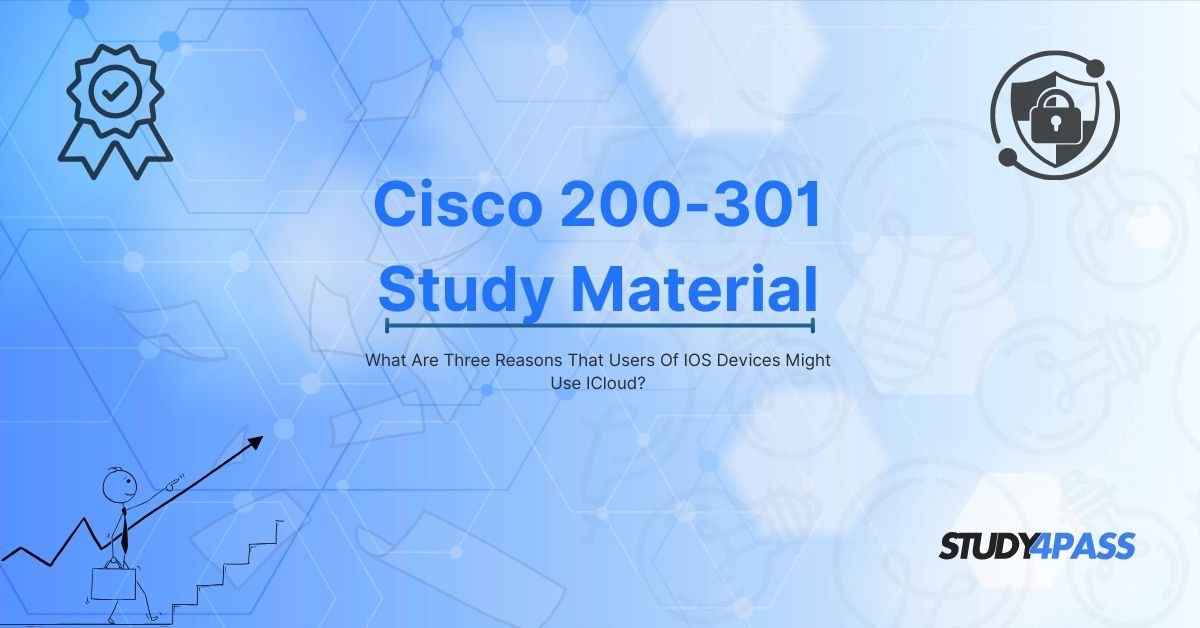Introduction to Cloud Storage And Computing Service
iCloud is a cloud storage and computing service developed by Apple Inc. It plays a crucial role in enhancing the functionality and user experience of iOS devices, including iPhones, iPads, and Macs. For users preparing for IT certifications like the Cisco 200-301 exam, understanding iCloud’s features is essential, as cloud computing is a fundamental concept in modern networking and operating systems.
This article explores three key reasons why iOS users rely on iCloud, while also connecting these concepts to operating system basics and Cisco 200-301 study material. Additionally, we will highlight how Study4Pass can help IT professionals and students master these topics efficiently.
Reason 1: Automatic Backup and Data Synchronization
How iCloud Backup Works?
iCloud provides seamless automatic backups for iOS devices, ensuring that critical data such as photos, contacts, messages, and app data is securely stored in the cloud. This feature is crucial for:
- Disaster Recovery: If an iPhone is lost, stolen, or damaged, users can restore their data effortlessly.
- Device Upgrades: When switching to a new iOS device, iCloud allows for smooth data transfer.
- Cross-Device Synchronization: Changes made on one device (e.g., adding a contact) reflect across all Apple devices linked to the same iCloud account.
Connection to Operating System Basics
In operating systems, data management and storage are fundamental concepts. iCloud’s backup system mirrors distributed storage mechanisms found in enterprise IT environments. Understanding this helps IT professionals grasp:
- File Systems: How data is stored, retrieved, and synchronized.
- Redundancy and Fault Tolerance: Ensuring data availability even if one storage medium fails.
Relevance to Cisco 200-301 Exam
The Cisco 200-301 certification covers network storage and cloud services. iCloud’s architecture aligns with:
- Cloud Computing Models (IaaS, SaaS): iCloud acts as a Software-as-a-Service (SaaS) solution.
- Data Redundancy Techniques: Concepts like RAID and distributed storage are mirrored in iCloud’s backup system.
Study4Pass Advantage
For students preparing for the Cisco 200-301 exam, Study4Pass offers simplified study guides, practice tests, and real-world examples (like iCloud’s backup system) to reinforce learning.
Reason 2: Seamless File Sharing and Collaboration
iCloud Drive and File Sharing
iCloud Drive allows users to:
- Store and Access Files: Documents, PDFs, and media can be accessed from any Apple device.
- Share Files Securely: Users can generate shareable links with permission controls.
- Collaborate in Real-Time: Apps like Pages, Numbers, and Keynote support live collaboration via iCloud.
Connection to Operating System Basics
File sharing is a core function of operating systems, involving:
- Permissions and Access Control: iCloud uses encryption and user authentication.
- Network File Systems (NFS): Similar to how enterprises manage shared storage.
Relevance to Cisco 200-301 Exam
The Cisco 200-301 syllabus includes:
- Network Protocols (SMB, FTP): iCloud Drive operates over HTTPS, a secure file transfer protocol.
- Cloud Security: Encryption methods used in iCloud relate to VPNs and secure data transmission topics in Cisco exams.
Study4Pass Advantage
Study4Pass breaks down complex topics like file-sharing protocols and cloud security into easy-to-understand modules, helping students grasp these concepts faster.
Reason 3: Enhanced Security and Privacy Features
iCloud Security Mechanisms
Apple prioritizes security with features like:
- End-to-End Encryption: Protects messages, backups, and sensitive data.
- Two-Factor Authentication (2FA): Adds an extra layer of security.
- Find My iPhone: Helps locate lost devices and remotely wipe data.
Connection to Operating System Basics
Security is a pillar of operating system design, involving:
- Authentication Mechanisms: iCloud’s 2FA aligns with OS login security.
- Data Encryption: Similar to BitLocker (Windows) or FileVault (macOS).
Relevance to Cisco 200-301 Exam
The Cisco 200-301 exam covers:
- Network Security Principles: Encryption, authentication, and access control.
- Device Management: Concepts like remote wipe are crucial in enterprise networks.
Study4Pass Advantage
Study4Pass provides interactive labs and quizzes on security topics, ensuring students can apply these concepts in real-world scenarios.
Final Verdicts
iCloud is an indispensable tool for iOS users, offering automatic backups, seamless file sharing, and robust security. These features not only enhance user experience but also align with operating system fundamentals and Cisco 200-301 exam topics like cloud computing, network security, and file management.
For IT professionals and students, mastering these concepts is easier with Study4Pass, which delivers concise study materials, practice exams, and real-world examples. By leveraging Study4Pass, candidates can gain a deeper understanding of cloud technologies and excel in their certification exams.
Why Choose Study4Pass?
- Simplified Cisco 200-301 Study Material
- Interactive Practice Tests
- Real-World Cloud Computing Examples
- Expertly Curated OS Basics Guides
For the best preparation, trust Study4Pass your ultimate partner in IT certification success!
Special Discount: Offer Valid For Limited Time “Cisco CCNA 200-301 Test Materials”
Sample Questions for Cisco 200-301 Test Prep
Actual exam question from Cisco's 200-301 Exam Prep Practice Test.
1. What is a key benefit of iCloud for iOS device users?
A) Free unlimited storage forever
B) Syncing contacts and calendars across devices
C) Running Windows applications
D) Blocking all advertisements
2. Why might an iOS user rely on iCloud?
A) To share files and collaborate using iCloud Drive
B) To remove all device restrictions
C) To downgrade their iOS version
D) To improve battery life significantly
3. Which of these is a valid use case for iCloud?
A) Bypassing Apple’s security features
B) Storing passwords securely with iCloud Keychain
C) Increasing RAM on an iPhone
D) Installing third-party app stores
4. iCloud helps iOS users by:
A) Allowing them to restore data after a device loss or upgrade
B) Providing free hardware repairs
C) Enabling direct phone calls from Macs without an iPhone
D) Removing the need for an Apple ID
5. Which feature is supported by iCloud for iOS devices?
A) Offline Siri processing
B) Finding lost devices using "Find My iPhone"
C) Converting iOS to Android
D) Speeding up Face ID recognition


